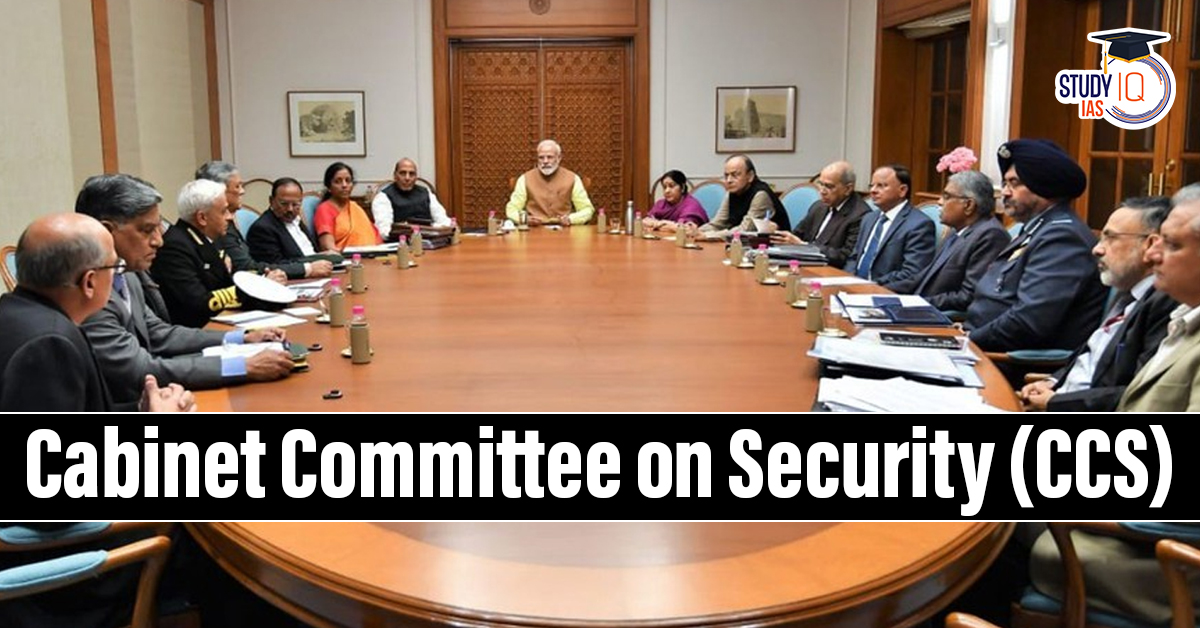Table of Contents
The Cabinet Committee on Security (CCS) is the most influential and important organ of the Indian government. With the responsibility of guiding and taking important decisions regarding national security, defense policy, and international relations, the CCS has an important role to play in protecting the sovereignty of India. Here, we will see the history, composition, role, and significance of the CCS and highlight its central role in national security governance.
What is the Cabinet Committee on Security (CCS)?
The Cabinet Committee on Security (CCS) is a senior-level decision-making forum of the Union Cabinet, which deals with matters concerning India’s national security, defense, intelligence, and strategic affairs. It is the topmost committee for making decisions regarding the nation’s internal and external security issues, defense policies, and appointments of top-level security personnel.
It is chaired by the Prime Minister and consists of senior Indian government ministers, such as the Home Minister, Defence Minister, Finance Minister, and External Affairs Minister. The National Security Advisor (NSA) serves as the secretary-level coordinator on CCS-related matters.
History of the Cabinet Committee on Security (CCS)
The origin of the CCS can be traced back to 1947, when it was first formed under the leadership of Prime Minister Jawaharlal Nehru. The committee was established in response to national security challenges faced by India in the post-Independence period. Its primary goal was to formulate policies related to the defense and security of the newly formed nation.
The structure of the CCS evolved after key events, particularly after the Kargil War of 1999. The committee was reorganized to become a more formal and structured body, with a clearer mandate and broader authority in overseeing national security decisions. The CCS has become an indispensable body for managing critical issues in national security, internal law and order, and external relations.
Composition of the Cabinet Committee on Security (CCS)
The Cabinet Committee on Security (CCS) consists of the following members:
-
Prime Minister (Chairperson): The Prime Minister of India chairs the CCS and is responsible for guiding discussions on national security issues.
-
Defence Minister: The Defence Minister plays a key role in the formulation and execution of the country’s defense policies and is integral to the decisions made by the CCS.
-
Home Minister: The Home Minister focuses on internal security, including law and order, counter-terrorism, and intelligence coordination.
-
Finance Minister: The Finance Minister’s role in the CCS is vital, particularly in matters related to defense budgeting, financial allocations for national security, and economic aspects affecting the country’s security.
-
External Affairs Minister: The External Affairs Minister oversees the international dimensions of national security, including diplomatic relations, peacekeeping efforts, and strategies related to foreign threats.
-
National Security Advisor (NSA): The NSA is the secretariat for the CCS and plays a critical role in coordinating national security efforts. The NSA provides intelligence inputs and advises the Prime Minister and the CCS on security matters.
Functions and Responsibilities of the Cabinet Committee on Security (CCS)
The Cabinet Committee on Security (CCS) is responsible for the formulation and execution of policies related to national security, defense, and intelligence. Some of the key functions of the CCS include:
-
National Security Policy Formation: The CCS is responsible for formulating and approving India’s national security policy, which includes defense strategy, intelligence coordination, and security operations.
-
Defense and Military Decisions: The CCS decides on matters related to the country’s defense needs, including the procurement of defense equipment, military modernization, and the development of defense infrastructure.
-
Counter-Terrorism Strategy: In cases of internal or external threats, particularly from terrorist organizations, the CCS formulates counter-terrorism strategies, including military action and intelligence operations.
-
Strategic Appointments: The CCS plays a vital role in the appointment of senior officials in national security bodies, such as the heads of intelligence agencies, defense forces, and national security apparatus.
-
Overseeing Intelligence Operations: The CCS oversees the country’s intelligence operations, particularly through agencies like the Research and Analysis Wing (RAW) and the Intelligence Bureau (IB), ensuring that intelligence is used effectively to safeguard national interests.
-
Crisis Management: In times of national crises, such as war, internal disturbances, or natural disasters with national security implications, the CCS takes immediate and decisive actions to ensure India’s security.
-
Nuclear and Space Security: The CCS also makes decisions related to India’s nuclear policies and space security, which are integral parts of the country’s defense strategy.
Why is the Cabinet Committee on Security (CCS) Important?
The Cabinet Committee on Security (CCS) holds immense significance in the functioning of the Indian government for several reasons:
-
Apex Decision-Making Body: The CCS is the ultimate decision-making body for matters related to defense, national security, and foreign policy. Its decisions have far-reaching implications for the country’s security.
-
Crisis Management and Rapid Response: The CCS ensures that the Indian government is prepared for any security challenges, including military conflicts, terrorism, or internal unrest. The CCS’s quick decision-making capacity is essential during emergencies.
-
Strategic Security Coordination: The coordination between different ministries and agencies through the CCS ensures that the country’s security apparatus functions smoothly. The involvement of top ministers and experts guarantees that critical security matters are handled efficiently.
-
International Diplomacy: The CCS’s role extends to handling foreign security matters, ensuring that India’s foreign policy aligns with its national security interests. It oversees India’s diplomatic responses to security challenges, such as cross-border terrorism.
Cabinet Committees in the Indian Government – Overview
Cabinet Committees in India are extra-constitutional bodies that are not explicitly mentioned in the Indian Constitution. They are formed to streamline decision-making and reduce the burden on the Union Cabinet. These committees are essential for ensuring that decisions are made quickly and effectively on specific issues.
Apart from the CCS, other prominent Cabinet Committees include:
-
Cabinet Committee on Economic Affairs (CCEA)
-
Cabinet Committee on Political Affairs (CCPA)
-
Cabinet Committee on Investment and Growth (CCIG)
-
Cabinet Committee on Parliamentary Affairs (CCPA)
-
Appointments Committee of the Cabinet (ACC)
The Prime Minister typically chairs most of these committees, including the CCS, making the role of the Prime Minister central in shaping the nation’s policies.
Conclusion
The Cabinet Committee on Security (CCS) is an indispensable part of India’s national security architecture. It ensures the country’s defense policies and security strategies are robust, effective, and timely. Given its role in crisis management, military strategy, and foreign policy, the CCS has a significant impact on India’s security and geopolitical position in the world. Its decisions influence national security outcomes and reflect the government’s commitment to protecting the sovereignty of India.


 Uttar Pradesh Budget Speech 2026–27: K...
Uttar Pradesh Budget Speech 2026–27: K...
 Off-Season Tulip Bloom: Causes, Climate ...
Off-Season Tulip Bloom: Causes, Climate ...
 Understanding Gravity: Laws, Theories an...
Understanding Gravity: Laws, Theories an...

























